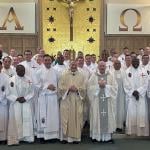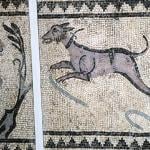Grammar Lesson of the Day: Odd Plurals
Old English words formed their plurals in various ways, depending upon the declension of the noun. All that means is that nouns belonged to different groups, and would take endings on the root according to that group, and the noun’s function in the sentence. The most plentiful group of nouns formed their nominative and accusative plurals by adding –as (accusative is the case for direct objects and for the objects of certain prepositions):
se stan, the stone; tha stanas, the stones
se heofon, heaven; tha heofonas, the heavens
After a while, English speakers simply began to apply that ending to almost all nouns; it was easy to do, and it didn’t cause misunderstandings. But some of the other plurals remained here and there, for words in very common use (and we can infer some interesting things about life back then, from the survivals). We call them “irregular” now, but that’s a slander. They were perfectly regular in their day. They didn’t pull up their roots and move to the land of the s’s. All they did was mind their own plurals.
Some of these words experienced vowel-change (umlaut) in the plural, whereby a back-of-the-mouth vowel was moved up front, by the influence of a y-sound in the following syllable, afterwards lost:
se monn, the man; tha menn, the men
se fot, the foot; tha fet, the feet
se gos, the goose; tha ges, the geese
People who live close to the land know about geese; also about mice and, alas, lice.
Other words added n or en to form the plural: so we have ox, oxen (German Ochs, Ochsen). They had a lot of cows, too, and that plural survived well into the seventeenth century: cow, kine (the spelling change from c to k is late, to avoid confusion): so Pharaoh dreamed of seven fat kine and seven lean kine.
Other words formed the plural by adding a short vowel, or by leaving the word alone. These had mainly to do with animals, and they show up now as unchanged from singular to plural:
one deer, two deer
one sheep, two sheep
And, by analogy, one moose, two moose.
In addition, we sometimes use the singular nouns for measurement, regardless of the plural meaning:
Ben Cartwright went to Stockton to sell a hundred head of cattle.
Pheidippides collapsed in heart failure after his twenty-six mile run.
Joe gets dizzy climbing a five foot ladder.
The hobo carried all his belongings in a small sack: a Gideon’s Bible, a change of underwear, a locket with his mother’s picture, and two pair of dice.
Welsh speakers say, “the boy,” and “the boys,” but nouns are always singular after a number: one boy, two boy, three boy, twenty boy; a room full of boys, about thirty boy in all.











